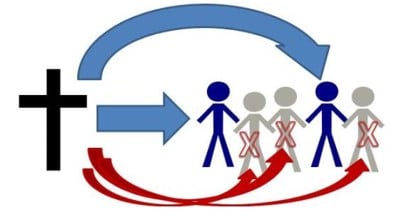I used these notes in my defense of Limited Atonement on the radio show. I did not use everything listed here. Nevertheless, they should help should you desire to follow along.
Limited Atonement – Christ bore the sin only of the elect and legally paid their sin debt, and not the sin debt of everyone who ever lived, (Col. 2:14; Rom. 6:6; John 10:15, 26).
- Christ’s blood was sufficient for all, but not all sin was imputed to Christ. The sufficiency of Christ’s blood and the extent of the legal act of His sacrifice are not the same thing. Christ’s blood is sufficient to cover all people. But that is not the same thing as legally bearing our sin debt. Let me explain.
- Sin is a legal problem since sin is breaking the Law of God. 1 John 3:4, “sin is lawlessness.” So, sin is a legal problem. It is not only a legal problem. But it is a legal problem because the Law deals with what is legal.
- Jesus equates sin with legal debt
- Matt. 6:12, ‘And forgive us our debts (opheilema), as we also have forgiven our debtors.”
- Luke 11:4, “And forgive us our sins (hamartia)…”
- Sin is a legal problem, so we need a legal solution? We need a legal, lawful sacrifice on the cross that deals with our sin.
- Jesus was made under the Law, Gal. 4:4 and he never sinned, 1 Pet. 2:22.
- Gal. 4:4, “But when the fullness of the time came, God sent forth His Son, born of a woman, born under the Law.”
- 1 Peter 2:22, “WHO COMMITTED NO SIN, NOR WAS ANY DECEIT FOUND IN HIS MOUTH;”
- So, Jesus’ sacrifice had to be according to O.T. Law, and sufficient in order to deal with the legal problem of breaking the Law of God. Again, breaking the Law of God is sin.
- Matt. 5:17, “Do not think that I came to abolish the Law or the Prophets; I did not come to abolish, but to fulfill.”
- Lev. 17:11, “For the life of the flesh is in the blood, and I have given it to you on the altar to make atonement for your souls; for it is the blood by reason of the life that makes atonement.”
- Deut. 17:1 “You shall not sacrifice to the Lord your God an ox or a sheep which has a blemish or any defect, for that is a detestable thing to the Lord your God.”
- John 19:36, “For these things came to pass, that the Scripture might be fulfilled, ‘Not a bone of Him shall be broken.'”
- John 19:30, “It is finished”, tetelestai, which has been found at the bottom of ancient tax documents signifying a legal debt had been paid in full.
- Col. 2:14, “[Jesus] having canceled out the certificate of debt consisting of decrees against us and which was hostile to us; and He has taken it out of the way, having nailed it to the cross.”
- “having canceled” is the Greek Exaleipsas, and it is an aorist participle in Greek. It means that it is a continuous action in the past
- “to cause something to cease by obliterating any evidence—‘to eliminate, to do away with, to wipe out.’
- KJV – blotting out; NKJV – “having wiped out”; ASV, YLT – “having blotted out”; ESV – “canceling”; NIV – “having canceled”
- Cheirographon
- What is canceled? Two options, the Moral Law and the Sin Debt. Let’s examine these.
- The moral Law
- Only those who have died are freed from the Law. The Law here is conceived of as a bill of debt.
- Rom. 7:4, “Therefore, my brethren, you also were made to die to the Law through the body of Christ…”
- Romans 4:15, “for the Law brings about wrath, but where there is no law, there also is no violation.”
- If there is no law because it has been canceled, then there can be no violation, no sin and people can’t go to hell.
- Only those who have died in Christ, have died to the Law and if we have died to the Law there is no law, no judgment that can condemn us. This applies only to Christians. But it is said that we died with Christ 2000 years ago.
- The sin debt
- If our sin debt is what is paid for on the cross and Col. 2:14 says that it is canceled, then it is either canceled for every person who ever lived or it is only canceled for the elect.
- Coma Man Illustration
- A man is on his way to the bank to pay his mortgage. On the way, he gets in a car accident and ends up in the hospital for a month in a coma. A philanthropist hears about the man’s condition and decides to pay off the entire mortgage of this man. He goes to the bank, makes the arrangements, writes a check, and the mortgages now paid. So we ask these questions, “Is the mortgage paid?” Yes. “Is the man’s debt canceled?” Yes. “Can the man be held responsible for the debt that has been canceled?” No.
The man wakes up from his and has a miraculous recovery. He gets in his car and hurries to the bank to pay his mortgage because he believes he’s late. He hands the check to the teller, the teller tells hin the debt has been paid. There is no way the bank can receive payment for debt is canceled.
Likewise, Jesus canceled our sin debt at the cross Colossians 2:14. Therefore a person cannot be held responsible for a sin debt that does not exist. If God were to punish a person for that sin debt that is canceled, then it would be that God was unrighteous. - Yes, we must believe in the sacrifice… and God grants that we believe (Phil. 1:29; John 6:28-29).
- God infallibly brings his elect to the faith so that they might then be justified when they believe.
- A man is on his way to the bank to pay his mortgage. On the way, he gets in a car accident and ends up in the hospital for a month in a coma. A philanthropist hears about the man’s condition and decides to pay off the entire mortgage of this man. He goes to the bank, makes the arrangements, writes a check, and the mortgages now paid. So we ask these questions, “Is the mortgage paid?” Yes. “Is the man’s debt canceled?” Yes. “Can the man be held responsible for the debt that has been canceled?” No.
- The moral Law
- They are not born saved.
- This is where irresistible grace comes in which is God’s regenerative work in us that leads us to freely believe in him.
- IF Jesus canceled out the sin debt for everyone who ever lived, ON THE CROSS, then how can people go to hell when their sin debt has been removed?
- IF a person’s sins are canceled/removed and he also goes to hell, then that means that God is unrighteous because he is punishing a person whose sins have been removed by His own sacrifice. The only thing they can do here is either deny the legal, substitutionary, atonement or adopt irrationality as their defense.
- If you deny that Jesus actually bore the sin of the elect and say that he bore the sin of everyone, then you have two problems.
- First, you are saying that people have had their sins paid for, canceled, and yet they go to hell. How is that possible if their sins don’t exist anymore?
- Second, you accuse God of unrighteousness because you have God condemn someone to hell whose sin debt has been canceled. Didn’t Jesus already remove the sin debt? Yes! Then they cannot go to hell.
- Objection: But you have to believe. Dying in unbelief is the greatest sin.
- Where in the Bible does it say that dying in unbelief is the greatest sin?
- We are commanded to believe in God,
- Ex. 20:3, “You shall have no other gods before Me.”
- Dt. 6:5, “You shall love the Lord your God with all your heart and with all your soul and with all your might.”
- John 14:1, “Do not let your heart be troubled; believe in God, believe also in Me.”
- Jesus did not bear all sin? If so, then the sin of unbelief was also born in his body and paid for. But this would be a problem and it means that Jesus did not bear all sin in his body on the cross.
- Jesus did not bear the sin of blasphemy against the Holy Spirit.
- Matthew 12:31, “Therefore I say to you, any sin and blasphemy shall be forgiven people, but blasphemy against the Spirit shall not be forgiven.”
- The sins of Eli’s house are not paid for, either.
- 1 Samuel 3:13–14, “For I have told him that I am about to judge his house forever for the iniquity which he knew because his sons brought a curse on themselves and he did not rebuke them. 14 “Therefore I have sworn to the house of Eli that the iniquity of Eli’s house shall not be atoned for by sacrifice or offering forever.””
- Jesus did not bear the sin of blasphemy against the Holy Spirit.
- There are two kinds of Limited Atonement. Which one do you believe in?
- You either limit the power of Christ’s sacrifice or you limit the scope.
- The reformed believe the sacrifice of Christ is so powerful that it automatically cancels the sin debt for everyone for whom Christ died. Therefore, the Reformed limit the scope.
- The non-reformed don’t believe the sacrifice of Christ is so powerful that it automatically cancels the sin debt for everyone for whom Christ died. Therefore, they limit its power.
- Either the sacrifice of Christ’s on the cross is powerful enough to automatically remove our sin or it is not. The Reformed say it is. The non-Reformed say it is not.
- You either limit the power of Christ’s sacrifice or you limit the scope.
The video presentation of this topic is found at https://www.youtube.com/watch?v=IlUex5X0buk
Return to Tulip Week Notes






